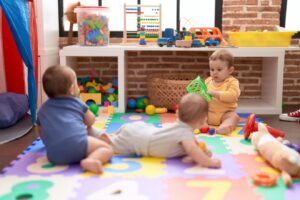
As parents and caregivers, we often marvel at the incredible growth and change that happens during early childhood. Between the ages of 4 and 5, children undergo a major developmental shift known as the “limbic leap.” At Love2Learn Early Learning Center in Mechanicsburg, PA, we understand the challenges this stage can bring and are here to support both your child and your family every step of the way.
What Is the Limbic Leap?
The “limbic leap” refers to significant brain development in the limbic system, the part of the brain responsible for emotions, social bonds, and emotional regulation. During this time, children experience heightened emotional sensitivity, increased empathy, and a surge of curiosity about themselves and others.
This is a natural and necessary stage in brain development, as the limbic system begins to connect more deeply with the prefrontal cortex (the decision-making center). However, this leap can feel overwhelming for children and their caregivers as they navigate big feelings and new social dynamics.
When Does It Occur?
The limbic leap typically occurs around 4 to 5 years old. It often coincides with a child entering a pre-kindergarten or kindergarten program, a time when they are also developing new independence and academic skills. While every child is unique, parents may notice this shift around their child’s fourth birthday, with changes becoming more pronounced over the following months.
Signs Your Child May Be Experiencing the Limbic Leap
Parents and teachers often notice certain behaviors and emotions during this stage. Signs of the limbic leap may include:
- Big Emotions: Increased emotional outbursts, mood swings, or feelings of frustration.
- Heightened Empathy: A sudden awareness of others’ feelings, leading to compassion or, at times, overwhelm.
- Increased Social Awareness: New anxieties or sensitivities related to friendships and group settings.
- Push for Independence: A desire to do things “all by myself,” even when help is needed.
- Questions and Curiosity: An explosion of questions about relationships, emotions, and the world around them.
While these behaviors are normal, they can be challenging for families to navigate without the right tools and support.
How Love2Learn Supports Families Through the Limbic Leap
At Love2Learn Early Learning Center, we recognize that emotional development is just as important as academic and physical growth. Our programs are thoughtfully designed to nurture children through this critical period in their development. Here’s how we help:
1. Emotional Support and Regulation Tools
Our teachers are trained to help children identify and express their emotions in healthy ways. We use tools like emotion charts, calm-down corners, and breathing exercises to teach self-regulation. These strategies help children manage big feelings and build confidence.
2. Fostering Empathy and Social Skills
Through group activities, storytime, and role-playing, we create opportunities for children to practice empathy, cooperation, and problem-solving. Books and activities that highlight emotions and friendships are central to our curriculum during this stage.
3. Consistent Routines and Safe Environments
We provide a stable and loving environment where children feel secure as they navigate their emotions. Consistent routines help children anticipate what comes next, reducing anxiety and encouraging independence.
4. Collaborative Communication with Families
We believe that supporting children through the limbic leap requires teamwork between school and home. Our teachers work closely with parents, sharing observations and offering tools to extend emotional learning at home.
5. Celebrating Growth
At Love2Learn, we celebrate every milestone—including emotional ones! Whether a child learns to share, calms down using a new strategy, or expresses empathy toward a friend, we highlight and reinforce these important steps in their development.
Final Thoughts
The limbic leap is a remarkable, if sometimes challenging, stage of development. While it may bring big emotions and new behaviors, it is also a time of tremendous growth in emotional intelligence and social connection. At Love2Learn Early Learning Center in Mechanicsburg, PA, we are committed to supporting your child through this leap with patience, care, and expert guidance.
If you have questions about this stage or would like to learn more about how our programs can help, schedule a tour today or reach out to our team. Together, we can ensure that your child feels loved, supported, and ready to grow into the best version of themselves.
Bibliography
- Siegel, D. J., & Bryson, T. P. (2011). The Whole-Brain Child: 12 Revolutionary Strategies to Nurture Your Child’s Developing Mind. Delacorte Press.
- Gopnik, A. (2016). The Gardener and the Carpenter: What the New Science of Child Development Tells Us About the Relationship Between Parents and Children. Farrar, Straus and Giroux.
- Panksepp, J., & Biven, L. (2012). The Archaeology of Mind: Neuroevolutionary Origins of Human Emotions. W.W. Norton & Company.
- Center on the Developing Child at Harvard University. (2011). Building the Brain’s “Air Traffic Control” System: How Early Experiences Shape the Development of Executive Function. Retrieved from https://developingchild.harvard.edu
- Perry, B. D. (2006). The Boy Who Was Raised as a Dog: And Other Stories from a Child Psychiatrist’s Notebook. Basic Books.





